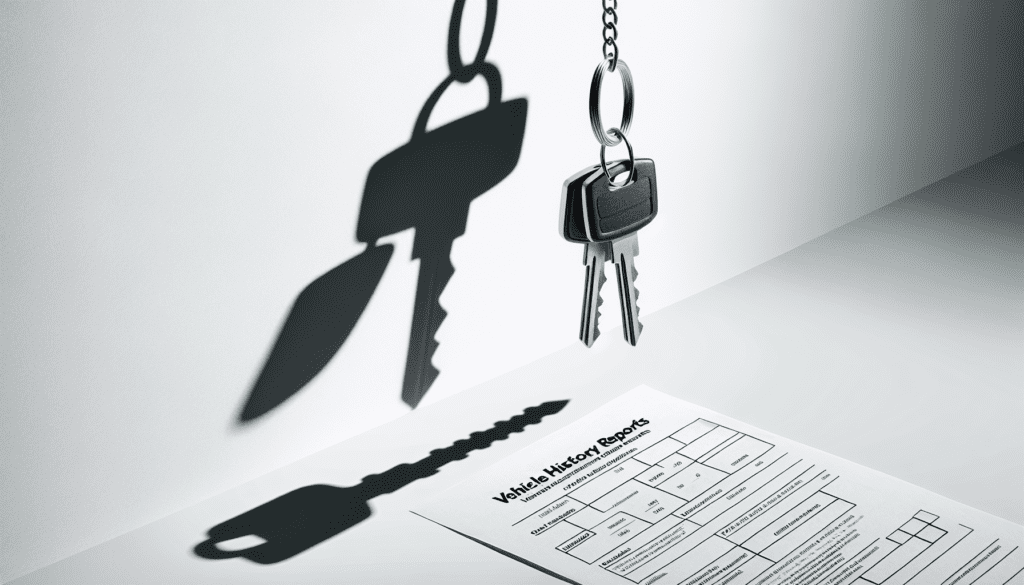If you’ve ever been in the market for a used car, you’ve probably wondered about its past. Has it been in any accidents? Are there any hidden issues that could come back to haunt you? Well, the good news is that with the availability of vehicle history reports, you no longer have to rely solely on the word of the seller. These reports provide you with a comprehensive snapshot of a vehicle’s history, allowing you to make more informed decisions and giving you the upper hand in negotiations. In this article, we will explore the various ways you can leverage vehicle history reports to your advantage when buying a used car.

Why Vehicle History Reports Are Important
Understanding the importance of vehicle history reports
When it comes to buying a used vehicle, it is crucial to have all the necessary information about its history. This is where vehicle history reports come into play. These reports provide valuable insight into a vehicle’s past, giving you a comprehensive understanding of its condition and potential issues. By having access to this information, you can make an informed decision and avoid potential headaches down the road.
Benefits of using vehicle history reports in negotiations
One of the key benefits of using vehicle history reports in negotiations is that it gives you a strong foundation to negotiate from. Armed with the information from the report, you can confidently discuss the vehicle’s history with the seller and raise any concerns or red flags that may have been identified. This helps establish a transparent and honest negotiation process, benefiting both parties involved.
How to Obtain a Vehicle History Report
Options for obtaining vehicle history reports
There are various options available for obtaining vehicle history reports. The most common and reliable sources include Carfax, AutoCheck, and the National Motor Vehicle Title Information System (NMVTIS). These platforms compile data from various sources, including the Department of Motor Vehicles (DMV), insurance companies, and auto auctions. It is essential to check the reliability and reputation of the provider before obtaining a report to ensure the accuracy of the information.
The cost of accessing vehicle history reports
The cost of accessing vehicle history reports can vary depending on the provider and the level of detail you require. Some providers offer free basic reports, while others charge a fee for more comprehensive information. It is recommended to invest in a detailed report as it will provide a thorough analysis of the vehicle’s history, potential accidents, title issues, and other crucial details. Considering the importance of this information, the cost of obtaining a vehicle history report is relatively minimal compared to the potential risks and expenses associated with purchasing a problematic vehicle.
Analyzing the Information in a Vehicle History Report
Interpreting the data in a vehicle history report
Vehicle history reports present a wealth of information that may seem overwhelming at first glance. However, understanding how to interpret this data is essential in making an informed decision. Pay close attention to the vehicle’s ownership history, mileage discrepancies, accident reports, and service records. This data can give you insights into how well the vehicle has been maintained and whether there have been any major issues in the past.
Identifying red flags in the report
While analyzing the information in a vehicle history report, it is crucial to be on the lookout for any red flags that may indicate underlying problems. Items such as salvage titles, flood damage, severe accidents, or multiple owners within a short period can raise concerns about the vehicle’s reliability and potential future repairs. Identifying these red flags early on will allow you to approach negotiations with a clear understanding of the vehicle’s condition and potentially negotiate a better deal.
Leveraging Vehicle History Reports in Negotiations
Using the report as leverage during price negotiations
A vehicle history report can be a powerful tool during price negotiations. If the report reveals any significant issues or discrepancies, you can use this information to negotiate a lower price. Highlight the potential costs of repairs or the diminished value of the vehicle due to its history. By presenting the seller with concrete evidence of the vehicle’s condition, you can strengthen your bargaining position and potentially secure a more favorable price.
Highlighting issues in the report to negotiate a lower price
Additionally, if the vehicle history report identifies any specific issues, such as previous accidents or major repairs, you can use this information to negotiate a lower price. Highlight how these issues may affect the vehicle’s overall value or future performance. By bringing attention to these concerns, you can demonstrate to the seller that you are well-informed and willing to negotiate based on the vehicle’s true condition.

Presenting the Vehicle History Report to the Seller
Discussing the report with the seller
When presenting the vehicle history report to the seller, approach the conversation with a friendly and firm tone. Explain that you have done your due diligence and have obtained a detailed report that provides an overview of the vehicle’s history. Demonstrate your understanding of the information it contains and express any concerns or questions that arise from the report. By initiating an open and respectful dialogue, you can create an atmosphere conducive to productive negotiations.
Addressing any concerns raised by the seller
During the discussion, it is crucial to address any concerns or counterarguments raised by the seller. Be prepared to respond to their questions or doubts, employing the information from the report to support your position. Keep the conversation focused on finding a mutually beneficial solution and be open to compromises. By addressing the seller’s concerns and remaining respectful, you can work towards reaching a fair agreement.
Negotiation Strategies Utilizing the Vehicle History Report
Using the report to justify a lower offer
One effective negotiation strategy is to use the vehicle history report to justify a lower offer. If the report reveals significant issues or potential repairs, you can explain how these factors affect the vehicle’s value and ask for a price reduction. Provide specific examples from the report, emphasizing the potential costs involved. By linking the report’s findings to a lower offer, you can strengthen your bargaining position and increase the likelihood of a successful negotiation.
Negotiating repairs or warranties based on the report
Another strategy is to negotiate repairs or warranties based on the information in the vehicle history report. If the report highlights specific areas of concern, such as a history of mechanical problems, you can request that the seller address these issues or provide a warranty. By using the report as justification, you can negotiate additional benefits or protections, reducing the potential financial risks associated with the purchase.
Understanding the Seller’s Perspective
Considering the seller’s knowledge of the vehicle’s history
While vehicle history reports provide valuable information, it is essential to consider the seller’s perspective as well. The seller may possess knowledge about the vehicle’s history that is not reflected in the report. They may have repaired or resolved issues not documented, or have conducted regular maintenance that positively impacts the vehicle’s overall condition. By keeping an open mind and actively listening to the seller’s experiences, you can gain a more comprehensive understanding of the vehicle’s history.
Anticipating counterarguments from the seller
During negotiations, it is crucial to anticipate counterarguments from the seller. They may challenge the accuracy of the report or question the relevance of certain information. Prepare yourself by thoroughly reviewing the report, understanding its limitations, and having valid counterarguments ready. By being prepared, you can effectively address any objections raised by the seller and reinforce the validity of the report’s findings.
Seeking Professional Advice
Consulting with mechanics or experts for further evaluation
While vehicle history reports provide valuable information, they have limitations. To ensure a thorough evaluation of the vehicle’s condition, consider consulting with mechanics or experts. These professionals can conduct a detailed inspection to identify any hidden issues that may not be reflected in the report. Seeking their advice will provide an additional layer of confidence in your negotiation efforts and help you make a well-informed decision.
Understanding the limitations of vehicle history reports
It is essential to recognize the limitations of vehicle history reports. These reports rely on available data and may not capture every detail of a vehicle’s past. Accidents that occurred without an insurance claim or maintenance performed at independent shops may not be documented. Additionally, the database used by the report provider may have gaps or delays in updating information. While vehicle history reports are valuable tools, they should be used as a starting point and not the sole basis for your decision-making process.
Negotiating with Dealerships vs. Private Sellers
Different approaches for negotiating with dealerships and private sellers
When negotiating with dealerships and private sellers, it is important to consider that each party operates differently. Dealerships typically have set pricing structures and may be more resistant to significant price reductions. Private sellers, on the other hand, may be more open to negotiation and willing to accommodate adjustments. Understand the dynamics of each situation and adapt your negotiation strategies accordingly to maximize your chances of a successful outcome.
Understanding the motivations of each party
Understanding the motivations of each party involved in the negotiation is crucial. Dealerships, for instance, are often driven by profit margins and sales quotas. Private sellers may be motivated by a desire to sell quickly or by personal circumstances. By understanding the underlying motivations, you can tailor your negotiation approach to resonate with the seller’s priorities, increasing the chances of a mutually beneficial agreement.
Finalizing the Negotiations
Reaching a mutually beneficial agreement
The ultimate goal in negotiations is to reach a mutually beneficial agreement. By utilizing the vehicle history report as leverage, addressing concerns, and employing effective negotiation strategies, you can work towards finding a solution that satisfies both you and the seller. Strive for open communication, flexibility, and a win-win outcome that leaves both parties satisfied.
Ensuring all necessary paperwork and documentation is completed
Once the negotiation is finalized, it is essential to ensure that all necessary paperwork and documentation are completed. This includes transferring the vehicle title, obtaining a bill of sale, and acquiring any warranty or service agreements discussed during the negotiation process. By ensuring that all the necessary paperwork is in order, you can confidently finalize the transaction and enjoy the peace of mind that comes with a well-negotiated and documented purchase.
In conclusion, leveraging vehicle history reports in negotiations is a wise and strategic approach when buying a used vehicle. With a thorough understanding of the importance of these reports, the process of obtaining, analyzing, and utilizing the information they provide becomes an invaluable tool in your negotiation arsenal. By utilizing the strategies outlined in this article, you can confidently navigate the negotiation process, maximize your bargaining power, and secure a favorable deal that meets your needs and expectations.

